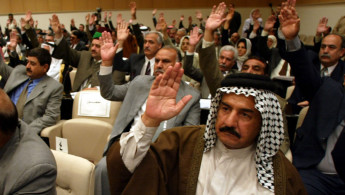Iraq's parliament set for speaker election amid political disputes
After over six months of political turmoil, the Iraqi parliament is gearing up for a crucial session on Saturday, 18 May, to elect a new speaker. This expected session comes amid ongoing disputes among Sunni factions and Shia blocs, which enjoy majority legislative representation.
The Iraqi parliament failed several times to elect a new speaker after Iraq's top court on 14 November ousted Mohammed al-Halbusi following his conviction of forgery of official records related to the resignation letter of one of the MPs.
On Monday, the parliament's media office announced that the legislative body will assemble to vote for a new speaker on Saturday. Last week, the parliament extended its session by a month to address the ongoing crisis surrounding the speaker position before beginning its summer recess.
Saturday's race will be between Iraq's former parliament speaker, Mahmoud Al-Mashhadani, and Iraqi Sunni politician Salem al-Issawi from Anbar province. Al-Issawi is a candidate for the Sunni Forces Alliance, representing three main Sunni political sides.
"Al-Mashhadani has a chance of winning the position by ninety per cent," a Kurdish source close to the Iraqi ruling elites told The New Arab on condition of anonymity. "Nouri al-Maliki initially preferred Mashhadani, but now Halbusi also backs him. Maliki and Iran prefer Mashhadani because he is close to them, and Issawi is seen as close to Turkey."
Al-Halbusi's Taqaddum [Progressive] party, which has 45 parliamentary seats, insisted that the speaker position is its entitlement. The parliament failed several times to elect a new speaker.
Criticism has been directed at Halbousi for allegedly succumbing to Iranian pressure to endorse Al-Mashhadani, evidenced by a widely circulated photo of their meeting on Iraqi social media.
رغم اعتراض عدد من قادة الإطار التنسيقي على ترشيحه..
— أنس عبد الرحمن (@anasanas1978) May 13, 2024
محمود المشهداني هو المرشح الأوفر حظاً لنيل رئاسة البرلمان.
السبت المقبل ١٨ ايار سيكون حاسماً أو ينتهي بمعركة مثل ما حدث سابقاً. pic.twitter.com/wf70dgsncp
Speaking anonymously to TNA, a Kurdish lawmaker in the Iraqi parliament expressed confidence in Mashhadani's chances of winning the position, citing his affiliation with the Progressive Party.
Since the US and UK-led invasion of Iraq in 2003, the country has an ethnic and sectarian power-sharing system where the speaker of parliament is usually a Sunni Arab, while the prime minister is a Shia Arab, and the president is typically Kurdish.
Al-Mashhadani, 74, was the speaker of the Iraqi Parliament from 2006 to 2009. He was forced to resign after being accused of "rude behaviour" towards deputies.
"Despite objections from several leaders of the Coordination Framework, Mahmoud al-Mashhadani is the most likely candidate to win the presidency of the parliament. Next Saturday, 18 May, will be decisive or could end up in a battle like what happened before," Iraqi journalist Anas Abdul Rahman wrote in a post on the X platform.
On 29 November, Al-Mashhadani exclusively told TNA that he is the only candidate for virtually all Sunni blocs in the election for a new speaker inside the parliament.
After extensive negotiations led by Muthanna al-Samarrai of the Resolve Alliance, Khamis al-Khanjar of the Sovereignty Alliance, and Thaabit al-Abbasi of the National Determination, a new coalition named The Sunni Forces Alliance in Iraq was officially declared in March. The new alliance combined has 30 seats.
They called on the ruling Coordination Framework (CF), an alliance of Iran-backed Shia blocs that holds a majority in the parliament, to support their nominee for the speaker position. The Sunni Forces Alliance emerged independently from the Progressive Party.
Shalan al-Karim, the former candidate of the Progress Party, failed to win the position on 13 March, only receiving 152 votes in the first round of voting. The parliament postponed the second round due to a dispute by some pro-Iran lawmakers.
Former Progressive Party candidate Shalan al-Karim withdrew from the race and resigned from his party in April, citing unjustified allegations and internal turmoil. He said he would work as an independent lawmaker in the parliament. Despite efforts to challenge his membership, Iraq's Supreme Federal Court upheld Karim's validity as a parliamentarian.
Three Iraqi MPs, Yousif Al-Kilabi, Falah Al-Khazali, and Hussein Mouns Faraj, had asked Iraq's top court to revoke Karim's membership, citing the absence of the constitutional and legal conditions required for a parliament member.
On Wednesday, Iraq's Supreme Federal Court refused the law case and confirmed Karim's membership in parliament as valid.
According to the Iraqi constitution, the candidate for parliament speaker must secure an absolute majority, surpassing 165 votes out of 329 lawmakers.





 Follow the Middle East's top stories in English at The New Arab on Google News
Follow the Middle East's top stories in English at The New Arab on Google News


